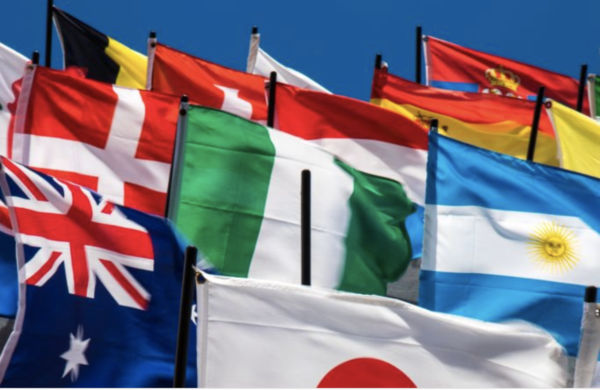Why Every Country Should be a Multilingual Country
There’s an old joke that a language is a dialect with an army. And there’s some truth in this, as modern languages are unique creatures. That’s why foreign language suppression can be so detrimental to the evolution of languages.
They’re organically rooted in human culture. In fact, people have been speaking languages far longer than we’ve had formal governments. But at the same time, modern languages are the product of intervention by centralized social structures, first through the church and now, governments. From Luther’s influence on unifying German to the reconstruction of modern Hebrew, many modern languages are slightly removed from their original organic roots.
In a way, modern languages are a bit like bonsai trees. They are born from seeds but shaped by hands over time into how they appear to us today.
But what happens when the guiding hand of one language comes into conflict with another?
This is often the case in multilingual cities and countries. Switzerland, Belgium, Singapore, Montreal, and many others experience a struggle between multiple linguistic powers. So, how can multilingual regions prioritize their main languages while respecting the status of others?

How Some Governments Attempt to Suppress Minority Languages
Worst-case scenario, a government tries to suppress minority languages in favor of the country’s main language. Why? Because for some reason, the view that language learning is a zero-sum game still exists. No matter how much evidence says otherwise, some people feel that if you take the time to learn another language, you somehow miss out on your own language or lose a part of your culture and identity. Sadly, this leads some governments to try and suppress other foreign languages.
These obstacles can range in severity. Governments can cut funding for foreign language education. They can make it harder to open businesses that cater to people speaking minor languages. Governments can also allow prejudice towards a minority group to go on unpunished. They can even outright ban the speaking of other languages. These efforts to “prune” a country’s language tree can have lasting, devastating effects on minority populations and the country as a whole.
The Lasting Effects of Trying to Suppress a Foreign Language
History is plagued with attempts to suppress and wipe out minority languages. From efforts to erase Hawaiian to the “Russification” of the Soviet Era, “Linguistic Genocide” isn’t a new concept. And the end result is usually the same: the promotion of racist ideologies and lasting bifurcations between populations that only stalls society’s progression.
Those that argue for foreign language suppression often do so from the angle that minority cultures should make better efforts to integrate. However, suppressing minority languages can actually have the exact opposite results that those in power think it might accomplish. Children who aren’t allowed to use their “mother tongue” find it harder to learn the dominant language in the area that they live.
Foreign language suppression can also severely limit the abilities of a nation’s population. Sadly, mythologies, xenophobia, and ignorance still plague people’s understanding of bilingual education. But across the board, bilingual children think faster, perform better on tests, and are more inclined to creative thinking because their brains function differently than monolingual speakers.
The Benefits of Multi-Lingualism
We live in an increasingly globalized world where being able to communicate with multiple countries opens up the doors to new opportunities. And while Engish may be the lingua franca, it’s only spoken by 25% of the world’s population. What’s more, every country in the world has minority languages within its borders. Embracing these cultures within showcases to the world how accepting you are of differences, inviting opportunities for growth of all kinds.
Countries Making The Effort to Preserve Languages
- Ireland: There have been lasting efforts to preserve the Irish language in this Bilingual country. In 2010, they passed the 20-Year Strategy for the Irish Language. In this plan, they set out a holistic and integrated approach to preserving the Irish language in everything from dictionaries to education to government services.
- Wales: Roughly 874,400 people speak Welsh, but it has been vulnerable because of the prevalence of English in the region. Its current rise in speakers comes from efforts made to preserve the language. The Welsh government hopes to see that number hit 1 million by 2050. Most of their efforts will focus on schools and providing resources for teachers to help educate the population.
- New Zealand: The New Zealand government plans to have Maori, the language of the indigenous people of New Zealand along with the country’s 2nd official language, taught in all schools around the country. It’s considered a major step in making the country bilingual. There have also been other efforts to preserve Maori in the past, like Rotorua’s goal to become New Zealand’s first bilingual city.
Countries Doing More Harm Than Good
- Canada (Quebec): Recently, Quebec officials faced pushback over trying to ban the “Bonjour/Hi!” greetings from use in stores. While French is the official language of Quebec, a recent report showed a decline in using French as a greeting. However, those who use the phrase believe it welcomes both French and English speakers.
- China: The Chinese government based in Beijing has long pushed for Mandarin to be the main language of China. While popular in North China, South China speaks mainly Cantonese. The Chinese government sees the push towards Mandarin as a way to unite its people. However, it comes at a cost of wiping out minority language populations within the country.
- The United States: Despite having the second-highest concentration of Spanish speakers in the world, there is still heavy pushback from embracing Spanish as an official language in the US. Current trends could see the number of Spanish speakers decrease. Spanish speakers regularly face discrimination and other issues when using their native language.
The Responsibility Is on Everyone

In each of these examples, the government was responsible for supporting or standing in the way of multilingualism. Having clear systems in place that make minority languages accessible to everyone on a daily basis makes it easier to promote bilingualism within a country. And ensuring students have access to years of effective language courses that expose them to other aspects of cultures within their countries provides the needed motivation to help preserve these languages. Simultaneously, if a government makes a weak effort or outright tries to push another language out, it can be that much harder for the minority language to survive in that environment.
But the onus isn’t entirely on the government. People influence change. Understanding that foreign language suppression does more harm than good can go a long way. Mainly, it can show governments that better efforts need to be made to support minority languages throughout their borders. In doing so, people from all backgrounds can grow to feel appreciated in a nation where everyone may not speak but they respect them enough to help preserve it.








